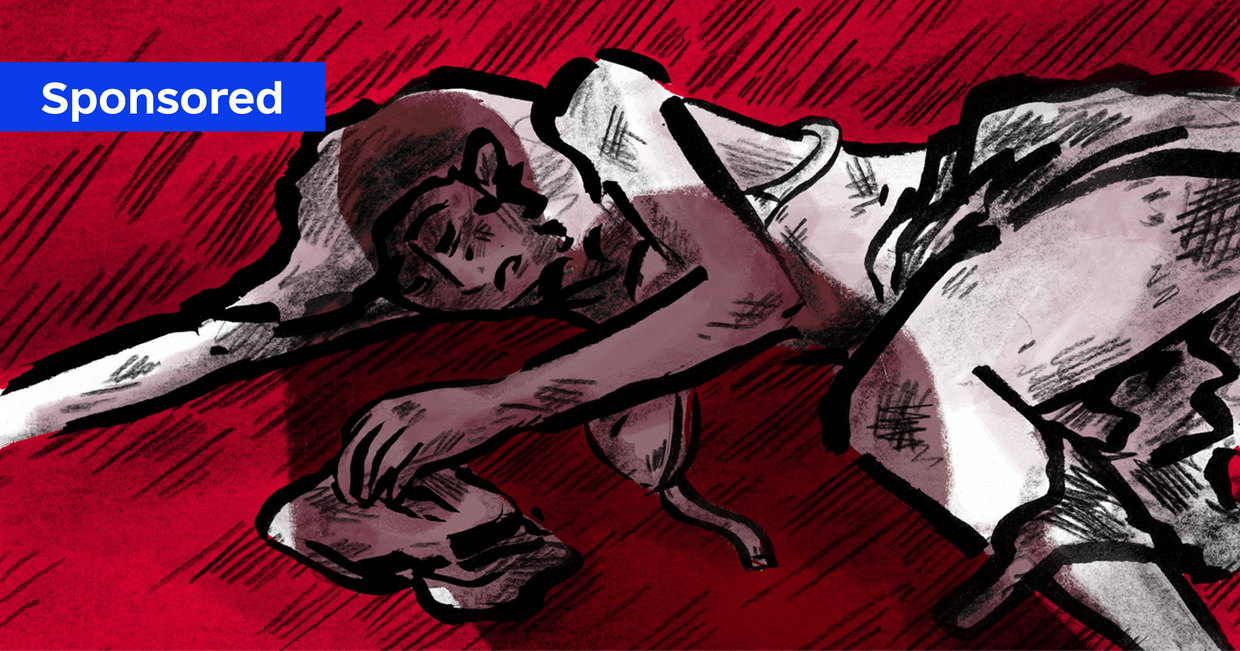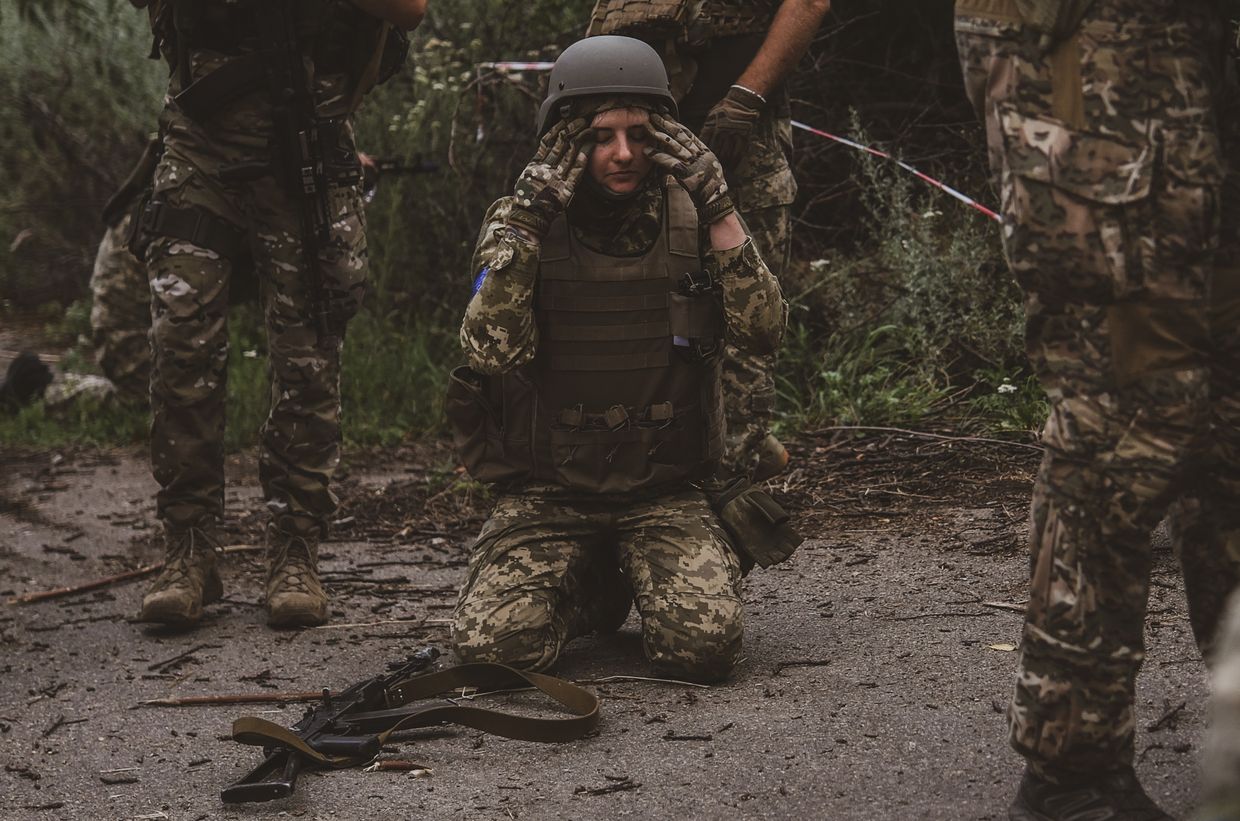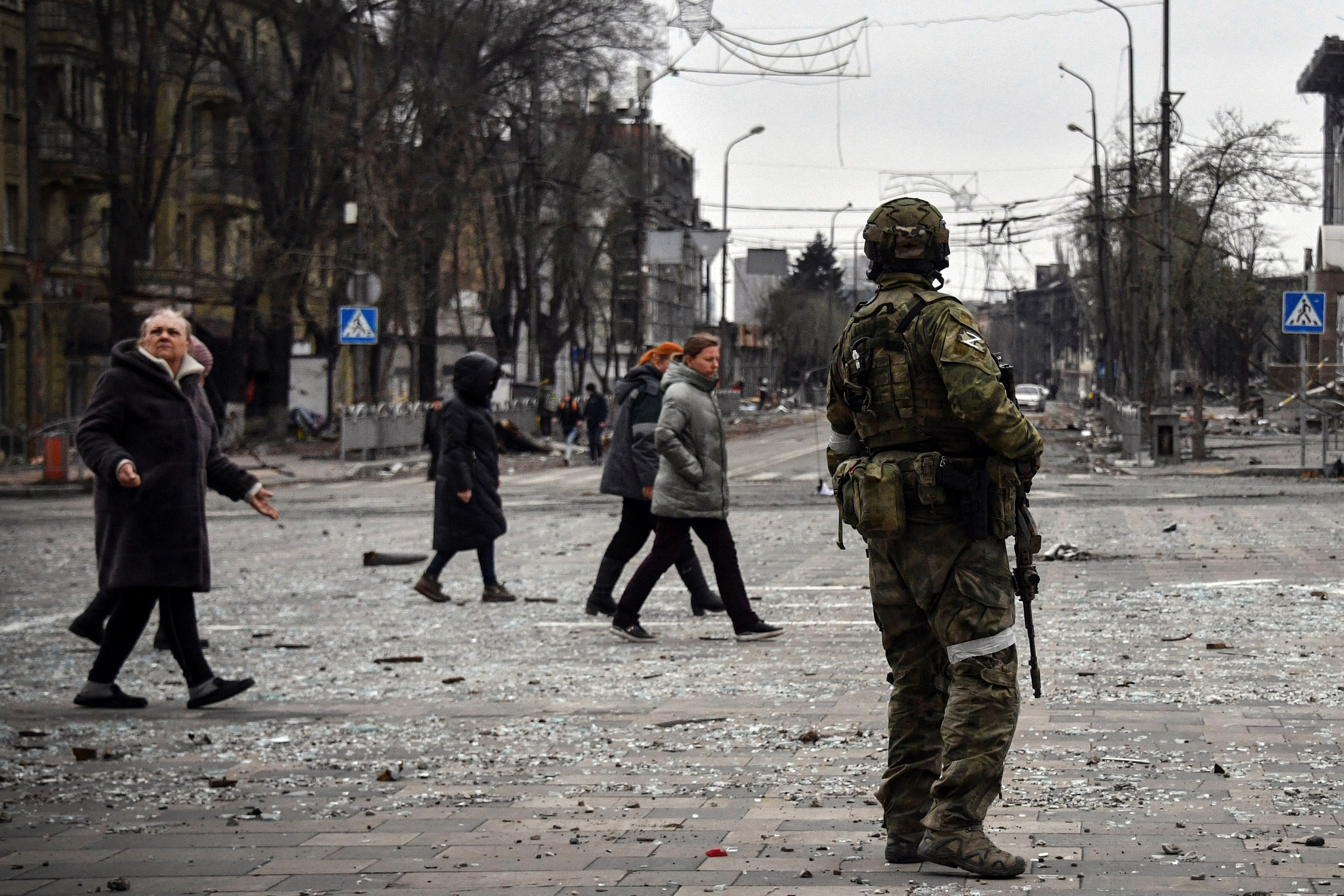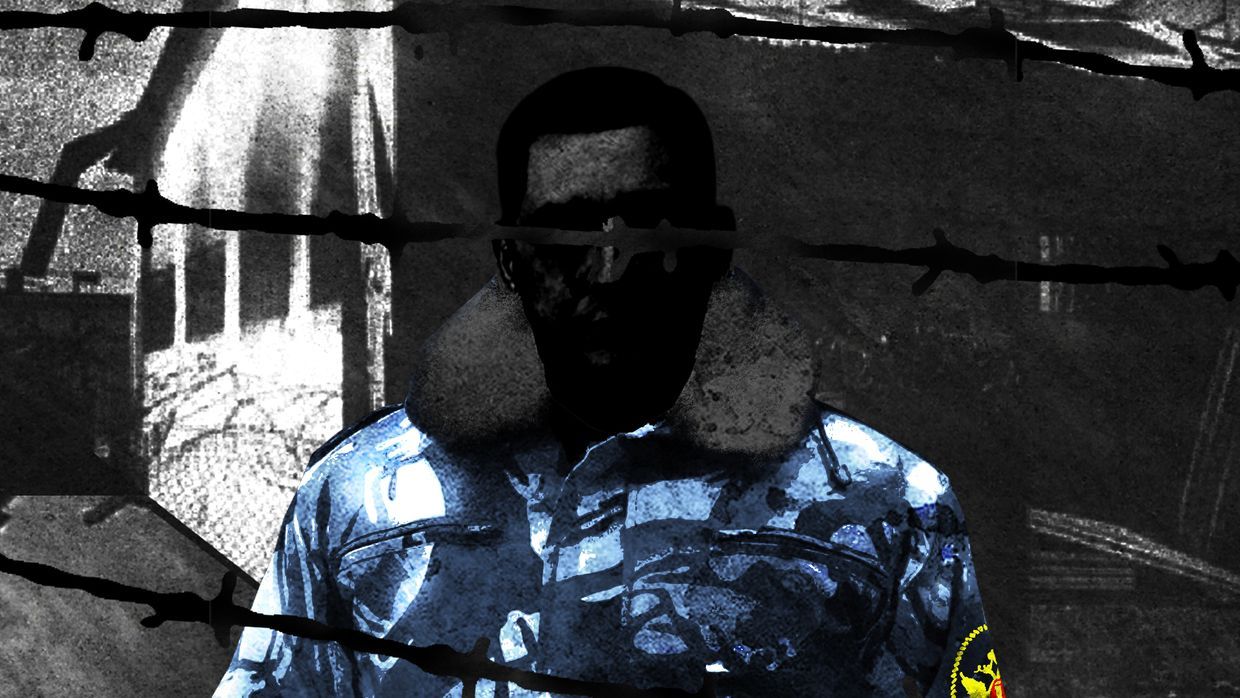War in Ukraine puts sex workers at higher risk of violence, disease

Editor’s Note: The names of the sex workers in this story have been changed to protect their identity out of concern for their safety and that of their families.
Katerina was lightly dressed for winter in a mini-skirt and short fur jacket as she stood alongside the road of a dimly lit park and waited for clients looking for sex.
She looked tired, and her attempts to disguise the dark circles under her eyes with a bit of makeup hardly hid what she had been through.
Katerina, 32 years old, was born in Donetsk, now occupied by Russia. She started working as a sex worker when she was 14, she told the Kyiv Independent.
“I left home when I was 10 years old, and I was living at a train station,” she recalled. “I met another girl who showed me I could make money that way.”
Russia’s war against Ukraine has made what was already a risky profession even more dangerous. Some soldiers, a significant portion of sex workers’ clients, suffer from post-traumatic stress disorder and can be prone to violence.
Clients also have fewer means to pay pre-war prices for sex and social services for sex workers have decreased since the start of the full-scale invasion.
As millions have been forced to flee their homes as a result of the hostilities, some women, displaced and unable to find other forms of employment, have turned to sex work.
There are an estimated 3.7 million people displaced in Ukraine as of November, according to a report from the UN. Women and children make up around 90% of people fleeing the crisis, and are at risk of gender-based violence and sexual exploitation and abuse, according to the UN.
Sex workers don’t always report abuse due to fear they will be held responsible, as prostitution is illegal in Ukraine. Every second sex worker doesn’t seek help in case of violence against them, according to the latest survey by Legalife-Ukraine, Ukraine's leading sex workers' organization.
The police widely ignore them, and sex workers, seen as “fallen women” among some institutions, are often considered second-class citizens with no access to proper legal protection or healthcare.
As a result, sex workers engage in unsafe sex that puts them at a higher risk of sexually transmitted diseases, including syphilis.
On alert, Katerina looked at the parked cars with apprehension, weighing which one to approach.
Since the full-scale invasion started, she says more clients than usual are on drugs, don’t have the means to pay, and soldiers often arrive in unstable mental states. She has refused more than she did before the war.
“What’s the point of going with them if I know they’re not gonna pay, and if I don’t know how soon I’ll come back if I even come back?” she said.
Riskier conditions for refugees
An estimated 86,000 sex workers were providing services in 2019, according to a report by the charity Alliance for Public Health.
It’s hard to estimate the current number of sex workers in the country, but the demographics have changed, Nataliia Isaieva, the head of Legalife-Ukraine, told the Kyiv Independent.
Sex workers often have a hard time finding any other form of gainful employment. Over 40% of Legalife’s survey respondents have no other source of income than sex work.
They’re often single mothers with a low education level who can’t earn money, find a job, rent housing, or support their family, especially when they have many children, Isaieva said. “So they start working (as sex workers),” she said.
Some refugees who had never provided sexual services before had turned to sex work when they were forced to move to other cities with higher rents, Isaieva said.
Polls showed that 15% of sex workers started after the full-scale invasion, according to a Legalife survey conducted among 340 sex workers published in December 2023.
Katerina confirmed an increase of internally displaced people among sex workers not far from the spot where she works. Some are teenagers, around 17 years old or younger, and under the influence of pimps to whom they give most of their earnings.
“There are a lot of them, they’re all very young and half-naked, sometimes they stand with just a fur coat and nothing underneath during winter,” she said. “Most of them are on drugs.”
Sex workers who earn for themselves and are not part of a network cannot be considered as having been trafficked, Natalia Holynska, an anti-trafficking project manager at Caritas Ukraine, told the Kyiv Independent.
Still, some women agree to have sex to survive, which is a form of trafficking, Holynska said.
They provide sexual services not for money but for food or for someone to help them set up somewhere. Refugees are particularly vulnerable to this form of trafficking when they flee from the frontline.
When they settle in a new city and struggle to find a job, they can be easy prey for human traffickers who lure them with jobs in the service industry or massage parlors, she said. “It’s a trap,” Holynska said.
Even for those who work for themselves, it’s hard to make a living out of sex work.
The war has significantly reduced the number of clients, said Katerina, who has four young children to support and struggles financially.
She said she charges between $16 and $55, depending on her service, but it’s far from stable. “Sometimes I earn over $200 an hour, sometimes nothing for five hours straight.”
Fear of soldiers
Ukraine’s mobilization changed the clientele, especially near the frontline. Sex workers now have to work with soldiers whose behavior can be unpredictable, putting an already vulnerable population at risk.
No less than 70% of sex workers said providing sex services had become more dangerous since the beginning of the full-scale invasion, according to Legalife’s survey.
“The girls are afraid, they try not to go with them,” Isaieva said. “They’re scared, but they still provide services to the military because this is the only opportunity to earn money.”
In the southern city of Mykolaiv close to the front lines, the majority of the clientele is from the military, which means sex workers don’t always have any other choice than working with them.
The curfew put in place during the war added to the danger because some women are sometimes forced to stay the entire night at a client’s place, Isaieva said.
In Mykolaiv, the curfew lasts from 10 p.m. to 6 a.m., which means an entire night with potentially abusive clients.
“They can only work during the day, or they’re forced to work until the morning,” she said.
Maria, a 46-year-old sex worker from Luhansk, had a few bad experiences with soldiers, who constitute most of her clientele. Boisterous and heavy set, she left the Russian-occupied city in 2014 with only “a few plastic bags.”
After a few years of sex work in the street, she found a stable job, but then Covid-19 hit, and she lost her job. She had to return to sex work to make ends meet. Her financial situation worsened after the full-scale invasion, and the clientele, too.
“At first, they were normal, and I respect our military, but I had some bad cases, like this guy, when I wished something bad happened to him,” she said without elaborating. “They’re mentally unstable.”
During the discussion, another sex worker came out of a car and joined the conversation. She had blood on her nose. She quickly wiped her wound and refused to say what happened.
“It’s okay, it’s nothing,” she said with a pale smile.
Lack of support
Prostitution is illegal in Ukraine. Sex workers can get a fine of up to Hr 300 (roughly $8), while human trafficking is punishable with up to 15 years behind bars.
“The problem is not the fine, but the fact that with such a record, the person will no longer be able to get a job,” Diana, a former sex worker who’s now Legalife’s coordinator, told the Kyiv Independent.
The security service of any company can refuse anyone who has a prostitution record, she said, although these records are not grounds for refusal by law. Sex workers are often considered second-class citizens and are associated with disease by potential employers.
On the other hand, the reluctance of the police to accept complaints from sex workers creates a climate of impunity for clients mistreating them. The profession is stigmatized, and sex workers are scared to report abuses.
Sex workers don’t file complaints because they’re afraid they will bear responsibility for the abuse in the eye of the law. They know they won’t easily find legal support. Legalife is one of their few resources for legal advice.
“The police say, ‘Don't be a sex worker, and no one will rape you,” Isaieva said. “A sex worker is raped, infected with disease, and it’s still her responsibility, according to the police.”
The police used to take small bribes from Katerina, but they lost interest when the full-scale invasion started, she said.
“They don’t touch us, I guess they have enough work,” she said. “Sometimes they come to us and ask if we’re okay.”
Maria hasn’t had contact with the police for a long time too, she said.
Health issues
Sex workers have a hard time finding medical support as doctors treat them like “fallen women” due to their post-Soviet mentality, Katerina said.
“Once a doctor knows that you’re a street worker, he’ll treat you differently,” she said.
In 2023, 60% of sex workers who turned to medical institutions for help faced stigmatization and discrimination by medical personnel, Legalife’s survey showed. Instead, they turn to NGOs to get medical advice and support.
Maksym, a paramedic who works with Legalife and declined to give his full name, regularly meets with sex workers to advise them on treatment, but he told the Kyiv Independent that he can’t legally prescribe them medicine as a doctor can.
He started helping sex workers when the full-scale invasion started because doctors won’t listen to them, he said, and therefore can’t treat them with adequate care. “There are not enough tolerant doctors in the country,” he said.
HIV and syphilis are among the most reported cases of sexually transmitted diseases among sex workers, according to Isaieva.
In 2023, almost 10,000 new cases of HIV and over 2,700 cases of AIDS were reported in Ukraine in 2023, according to the Health Ministry.
The numbers may be higher, as, according to estimated data, by the end of 2021, every fourth person with HIV did not know their status, and people in occupied territories are not part of the statistics.
Cases of syphilis are still undocumented at a nationwide level, which makes it hard to track, but the epidemic could spread when untreated soldiers come back from the frontline, Isaieva said.
At the beginning of the full-scale invasion, social workers had fewer condoms to distribute and fewer clean needles to prevent sharing among drug users because all the prevention programs came to a standstill, which raised the risk of HIV and other diseases.
Isaieva was approached by the National Council and UNAIDS, the UN’s program on HIV/AIDS. The program wanted to deliver 200 condoms per sex worker per year, a meager amount considering that sex workers use at least two condoms per client.
“On the front line, condoms are not always available,” Isaieva said, which puts sex workers and their clients at risk.
Yet, far from the front, Maria’s biggest fear is not her personal safety, health, or which client she’ll have.
“I’m more afraid of meeting people I know because I don’t want anyone to know I work here,” she said.
A few steps away, Katerina leaned over the window of a car. After a swift negotiation and another cigarette, her silhouette got in the car before disappearing into the night.















